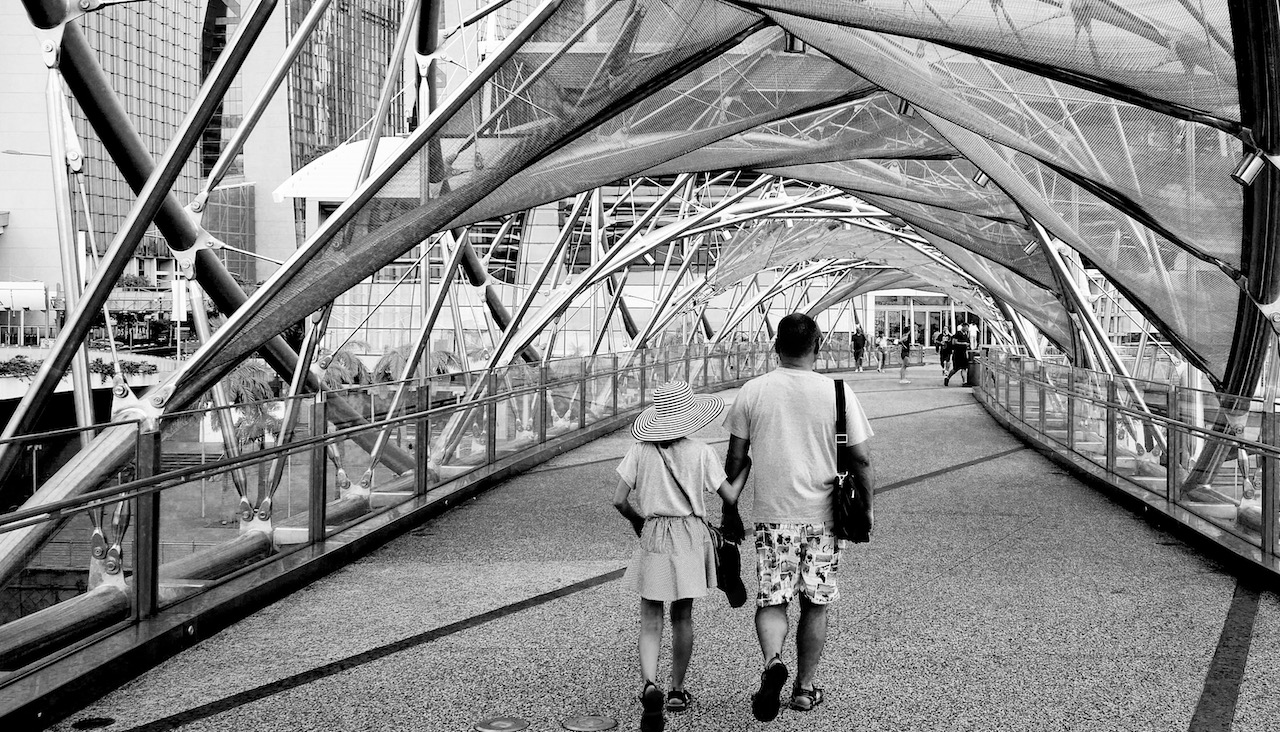My father, a civil engineer, taught me how to build walls.
First, ensure a strong foundation; the more complex the project, the deeper the foundation should be. Decide early on what you will reveal about yourself and what you will keep private. Commit to the decision, despite your daughter’s sorry attempts to change your mind.
Then, pick the right amount of bricks; the higher the wall, the more you will need, and the longer it will take to complete. If you find yourself wavering, remind yourself of all the time you’ve already spent on your wall. You don’t want it to go to waste.
Next, lay down the bricks and hold them together with cement. Counter any attempt to penetrate your wall with answers that are obliging but vague. Never reveal anything substantial.
When your daughter is in her late teens, mention in passing that she’s partially Peranakan. Suggest that this is probably why she can handle spicy food so well. If she asks why you never mentioned it before, simply shrug and chuckle.
It isn’t strange at all that she doesn’t know the basic facts of her family’s heritage.
Finally, surround your wall with an impenetrable air of elusiveness that she will spend the rest of her life breathing in. Let her wonder if it’ll eventually suffocate her.
You can spend your entire life growing up around someone, but not know them at all.
Otherwise, love is shown through food or other material things that my father insists on paying for, each gift bringing with it a spark of hope that the wall between us will one day be torn down.
I suspect this emotional void is present in many other paternal relationships too. A quick poll within RICE revealed that none of us regard our fathers as “friends”. To us, they have always been figures of authority, and our unemotional interactions with them are largely influenced by Asian conservatism.
One colleague shared that his relationship with his parents is “superficially good”; another admitted that being alone with either parent can feel “awkward” because of an invisible pressure to fill the silence.
As our conversations revealed, you can spend your entire life growing up around someone, but not know them at all.
With mothers, however, it’s slightly different. Women tend to be more vocal with their thoughts and feelings. So, for instance, even if you have an emotionally distant mother, she may still open up about her thoughts on current issues, helping you grasp a sense of who she is.
Still, I remember the first time I heard a friend remark that she told her parents “everything”. She’d injected this information so casually into the conversation that I wondered if she realised its gravity.
“What do you mean everything?” I inhaled sharply, bewildered by this peculiar and enviable notion.
“Even your feelings…?”
Yes, she confirmed. It wasn’t a big deal; she considered them her best friends.
To me, a best friend is someone you can be completely, absolutely honest with. You are comfortable turning to them in your darkest, most shameful moments. They are privy to the extent of how horrible you can be; while they make sure you understand how badly you’ve messed up, their love for you remains uncompromising.
Yet calling someone your best friend takes two hands to clap. In turn, they must let you into their lives; they must be open to equal vulnerability.
This couldn’t be further from the relationship my colleagues and I have with our fathers, though it’s not for want of trying.
Many of us have attempted asking our parents prying questions about a family feud or some secret or drama, only to have our curiosity brushed aside. They claim it’s “none of [our] business”, “too troublesome to explain”, or they just want to “protect” us.
But as we’ve gotten older, we’ve learnt to see our parents as multifaceted humans with their own histories of heartache. We are better able to understand their problems.
Still, our parents stick with the same excuses and apply yet another coat of paint when we attempt to delve deeper into their lives, reminding us that we are always their child first, fellow human second.
Eventually, some of us close up too; we forget who built these walls in the first place, and learn to call them our own.
We stop trying to get to know our parents.
When my father taught me how to build walls, I never realised I would one day need to find my way out from behind my own.
However, when I asked if I could treat him to an early Father’s Day meal last weekend, he turned me down saying he would like to stay home and rest. The rejection wasn’t unexpected. Later, realising I’d expected my father to react this way sent me down a deeper spiral of disappointment.
The thing is, I already have sufficient material throughout my life to write about my pathetic attempts at getting him to let down his guard.
A few years ago, when I took my father for a meal at a Chinese restaurant, I realised while we were perusing the menu that I had no idea which dishes he would pick. Did he prefer rice or noodles? Which condiments he would later dip his dim sum into? What drink would he want to pair his food with?
Over dinner, I wanted to talk to him about my grandparents and his youth. I wanted to hear his honest thoughts on all the men I had dated. Instead, I asked if he liked the food. I knew the walls he built over decades wouldn’t come down within a few hours, but that day, I didn’t expect to be the person who reinforced them.
That night, my father and I sat barely 50 centimetres apart, but a whole universe spanned the distance between us.
When my father taught me how to build walls, I never realised I would one day need to find my way out from behind my own. I decided to write this because I’m tired of feeling like a fraud whenever someone commends me for getting strangers to open up so easily. I tear down walls for a living, but I can’t even prevent my father from fencing himself in nor myself from following suit.
People say that insanity is doing the same thing over and over again and expecting different results. The reach for a parent’s heart can be an all-consuming madness.
For as long as I can remember, I’ve been a daughter who repeatedly tries to scale her father’s walls, aware that she isn’t much of a rock climber—yet hoping what’s on the other side will be worth the bruises and broken bones, even if they may take a lifetime to heal.








